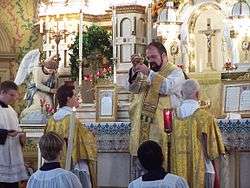Embolism (liturgy)
The embolism in Christian Liturgy (from Greek ἐμβολισμός, an interpolation) is a short prayer said or sung after the Lord's Prayer. It functions "like a marginal gloss" upon the final petition of the Lord's Prayer (". . . deliver us from evil"), amplifying and elaborating on "the many implications" of that prayer. In the Roman Rite of Mass, the embolism is followed by the doxology or, in the Tridentine Mass (which does not have that doxology), by the Fraction.
According to the 1913 Catholic Encyclopedia, "[t]he embolism may date back to the first centuries, since, under various forms, it is found in all the Occidental and in a great many Oriental, particularly Syrian, Liturgies."
In the Roman Rite
In the Mass of the Roman Rite, as revised in 1969, the priest celebrant says or sings:
The English translation is:
A less literal English translation was used before 2011:
Older form
In the Tridentine form of the Roman Missal the embolism, said inaudibly by the priest except for the final phrase, "Per omnia sæcula sæculorum", is:

Liturgy
Liturgy (Greek: λειτουργία) is the customary public worship performed by a specific religious group, according to its particular beliefs, customs and traditions.
The word, sometimes rendered by its English translation "service", may refer to an elaborate formal ritual such as the Eastern Orthodox Divine Liturgy (Greek: Θεία Λειτουργία), Catholic Mass, the Eucharist or Mass (Anglican Communion) or a daily activity such as the Muslim salah and Jewish services. As a religious phenomenon, liturgy is a communal response to the sacred through activity reflecting praise, thanksgiving, supplication, or repentance. Ritualization may be associated with life events such as birth, coming of age, marriage and death. It thus forms the basis for establishing a relationship with a divine agency, as well as with other participants in the liturgy. Methods of dress, preparation of food, application of cosmetics or other hygienic practices are all considered liturgical activities.
Etymology
The word liturgy, derived from the technical term in ancient Greek, leitourgia, signifies the often expensive offers of service to the people, and thus to the polis and the state. Through the leitourgia, the rich carried a financial burden and were correspondingly rewarded with honours. The leitourgia became both mandatory and honorific, supporting the patron's standing among the elite. The holder of a Hellenic leitourgia was not taxed a specific sum, but was entrusted with a particular ritual, which could be performed with greater or lesser magnificence. The chief sphere remained that of civic religion, embodied in the festivals: M.I. Finley notes "in Demosthenes' day there were at least 97 liturgical appointments in Athens for the festivals, rising to 118 in a (quadrennial) Panathenaic year." Eventually, under the Roman Empire, such obligations, known as munera, devolved into a competitive and ruinously expensive burden that was avoided when possible.
Liturgy (disambiguation)
Liturgy is a Christian term with several meanings:
Liturgy may also refer to:

Eucharist in the Catholic Church
The Eucharist in the Catholic Church is the celebration of Mass, the eucharistic liturgy. The term Eucharist is also used for the bread and wine when transubstantiated (their substance having been changed), according to Catholic teaching, into the body and blood of Jesus Christ
Blessed Sacrament is a devotional term used in the Roman Catholic Church to refer to the eucharistic species (the Body and Blood of Christ). Consecrated hosts are kept in a tabernacle after Mass, so that the Blessed Sacrament can be brought to the sick and dying outside the time of Mass. This makes possible also the practice of eucharistic adoration.
New Testament foundations
The First Eucharist in Scripture
The Catholic Church sees as the main basis for this belief the words of Jesus himself at his Last Supper: the Synoptic Gospels (Matthew 26-28; Mark 14:22-24; Luke 22:19-20) and Saint Paul's 1 Corinthians 11:23-25 recount that in that context Jesus said of what to all appearances were bread and wine: "This is my body … this is my blood." The Catholic understanding of these words, from the Patristic authors onward, has emphasized their roots in the covenantal history of the Old Testament.
Podcasts:

